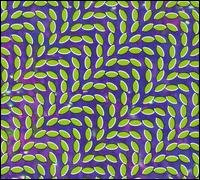 The Dead Weather
The Dead Weather
Horehound
Score: 6
Not sated by being the backbone of two bands concurrently, Jack White managed to start a third. In The Dead Weather, he sets his ax aside and gets behind the drum kit, letting Alison Mosshart of The Kills sing lead. Still, you'll hear plenty of him on Horehound. There are a few reasons for this: 1) Much of the album involves backing vocals, which he is supplying; 2) His voice tends to cut through hers when they sing in unison; 3) They both have backgrounds in bluesy garage rock, so their singing styles are similar (which makes it easier for his vocals to sneak to the front). Dean Fertita of Queens of the Stone Age (guitar, keyboard) and Jack Lawrence of The Raconteurs (bass) fill out the lineup, and Fertita's organ runs lend a '70s feel. Dark boogie blues are the focus of Horehound, which teems with seedy characters and outlaws. There's even a pony named Lucifer. Whether it's the grinding buzz of first single "Hang You From the Heavens" or the scrabble of sticks in "60 Feet Tall," Horehound delights in its seaminess and foreboding. On "So Far From Your Weapon," Mosshart groans out, "I tried to give you whiskey, but it never did work / suddenly you're begging me to do so much worse." White echoes the lines, clearly feeding on the suspense. Now, has he had his fill, or are The Dead Weather just whetting his appetite?
 DovesKingdom of Rust
DovesKingdom of RustScore: 7
The fourth album by Manchester trio Doves amalgamates their distant past, near-present and ... parallel universe past? Sci-fi excursion "Jetstream," an homage to Vangelis and the 1982 film "Blade Runner," evokes Kraftwerk with its atmospheric synths and shooshing hi-hat patter, drummer Andy Williams striking with metronomic efficiency. "We always wanted to write an imaginary song for the closing credits," the band wrote on their Web site in late January when they gave away the song as a prerelease. "Jetstream" doesn't really fit with the rest of the album, though
Kingdom of Rust is their most varied one to date. "Compulsion," with bass flapping like baggy pants, is the kind of song they used to bust out in the early '90s as Sub Sub, their pre-Doves incarnation. 'Course, one difference is that in those days, anthems weren't their calling card.
Kingdom of Rust, like each Doves album before it, finds consistency and strength in Jimi Goodwin's vocal melodies, which soar conspicuously through every track. Even though they never would've worked for "Blade Runner."
 Asobi SeksuHush
Asobi SeksuHushScore: 6
Hush doesn't possess the verve of 2006's
Citrus, but at least Asobi Seksu were up front about that. Instead, it gives their chiming guitar pop a slightly mild tenor that takes a few listens to appreciate. "Layers," chaste and dainty in its glimmering, is the clear standout, and a faster approach likely would have unspooled it. Overall,
Hush is very similar to
Citrus in dynamics and song structure, so anyone who enjoyed it would almost certainly find
Hush appealing. The main difference between the releases, aside from the obvious fact that they're comprised of different songs, is that
Hush seems to have a diaphanous film over it, whereas everything on
Citrus snapped with crisp and masterful reverb. This production choice might help unify the album, but it does slightly restrain uptempo moments and crescendo passages. When Yuki Chikudate is oh-oh-whoaing to infinity on "Transparence" and the drum kit is taking a beating and James Hanna's guitar is surging ... it never quite takes off. The track's still lovely, but after tasting the sky, you don't feel the same way about the ground.

































